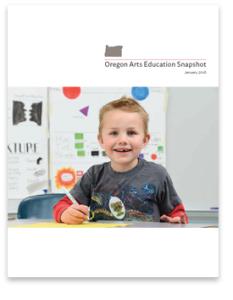
Author: Oregon Community Foundation
Publication Year: 2016
Media Type: Report
Summary:
A report that provides an overview of arts education programming delivered by nonprofit organizations in the state of Oregon.
Abstract:
The Oregon Community Foundation (OCF) and Oregon Arts Commission (OAC) announce the Oregon Arts Education Snapshot, a report that provides an overview of arts education programming delivered by nonprofit organizations in the state. This report’s release coincides with the newly authorized federal Every Student Succeeds Act (ESSA), which cements the arts as co-equal with other subject areas, such as math and language arts, as part of a “well-rounded education.” While the new ESSA provisions represent a step toward ensuring access to arts education for all students in Oregon, there is still much progress to be made.
Over the last two decades, many Oregon schools have drastically reduced or eliminated arts education programs due to budget cuts. As a result, nonprofit organizations across the state have expanded their role in delivering arts education both during the school day and in out-of-school time. Ensuring that these vital programs continue to expand and grow will require increased awareness and advocacy.
Based on survey results, the report finds that while no two organizations providing arts education are the same many share similar characteristics.
- Regardless of budget size, most organizations use less than two FTE staff to deliver arts education programs and many rely on volunteers and contractors.
- In terms of programming, over half of organizations provide out-of-school time and/or summer instruction and music is the most commonly offered discipline.
- While around 80 percent of organizations serve students in kindergarten through 12th grade with one or more of their programs, less than 40 percent of organizations serve children ages 0 to preschool.
In delivering their programs, organizations face a variety of challenges. Responding organizations cited lack of funding, other curriculum priorities in schools, and a lack of space and/or time in schools as the greatest hurdles to providing arts education. Underlying all of these challenges is the need for greater advocacy and more value placed on arts education in communities across the state.
Arts & Intersections:
Categories: Arts Education
ADDITIONAL BIBLIOGRAPHICAL INFORMATION
Series Title:
Edition:
URL: http://www.oregoncf.org/Templates/media/files/research/oregon_arts_education_sn…
SBN/ISSN:
Pages: 20
Resources: Document
PUBLISHER INFORMATION
Name: Oregon Arts Commission
Website URL: http://www.oregonartscommission.org/